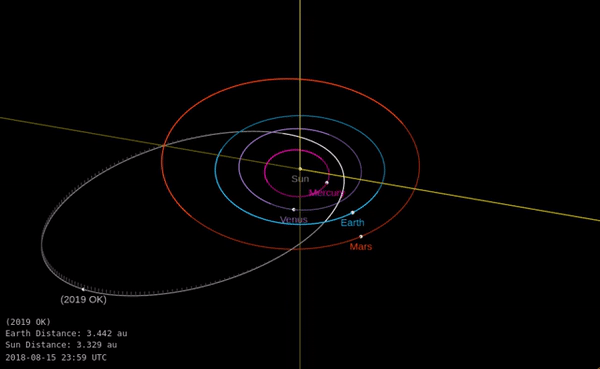A huge asteroid flew very close to Earth last week. How did we miss it?

The asteroid managed to get within just 73,000 kilometers (45,360 miles) of our planet without anyone noticing. The miss lends a new sense of urgency to preparations for a potential collision one day.
The news: On Thursday, July 25, an asteroid dubbed Asteroid 2019 OK, measuring 57 to 130 meters wide (187 to 427 feet), got uncomfortably close to Earth, according to NASA’s near-Earth objects database. It was less than one-fifth of the distance to the moon, making it a very close call in space terms. If it had landed on a populated area it could have caused major damage, although this outcome is statistically quite unlikely.
Should we worry? It’s hard not to feel concerned that a “city-killer”-size asteroid wasn’t detected further ahead of time. It was announced just hours before it passed by Earth, after being detected a few days beforehand by teams in the US and Brazil. Its relatively small size, unusual orbit, and fast speed all conspired to make it tough to spot, researchers told the Washington Post.
How we monitor asteroids: Mostly, we keep an eye out using Earth-based telescopes. A space-based infrared telescope designed specifically for the purpose of spotting asteroids would be better for early detection, according to NASA. So the agency plans to launch the Near Earth Object Camera in 2021.
A wake-up call: It’s a reminder of the real threat asteroids can pose. Although NASA has war-gamed scenarios and done training exercises with other US agencies on how to prepare for an impact, there’s a strong argument for more international cooperation and investment when it comes to detection and prevention. Asteroid 2019 OK’s worryingly close fly-by might help focus minds.
Want to stay up to date with space tech news? Sign up for our newsletter The Airlock.
Deep Dive
Space
How to safely watch and photograph the total solar eclipse
The solar eclipse this Monday, April 8, will be visible to millions. Here’s how to make the most of your experience.
How scientists are using quantum squeezing to push the limits of their sensors
Fuzziness may rule the quantum realm, but it can be manipulated to our advantage.
The race to fix space-weather forecasting before next big solar storm hits
Solar activity can knock satellites off track, raising the risk of collisions. Scientists are hoping improved atmospheric models will help.
Stay connected
Get the latest updates from
MIT Technology Review
Discover special offers, top stories, upcoming events, and more.